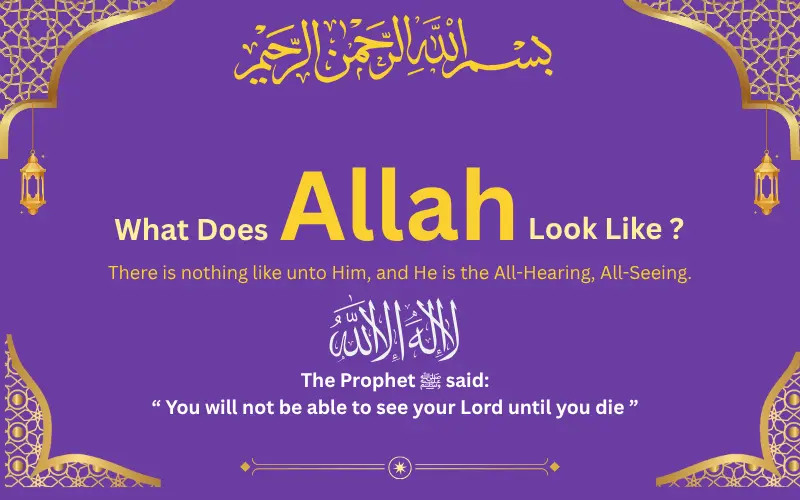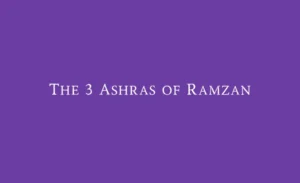In our pursuit of understanding our Creator, it is natural for humans to ask questions like “What does Allah look like?” or هل يشبه الله خلقه. However, such a question requires deep reflection based on the Qur’an, authentic Hadiths, and the consensus of Islamic scholarship. In every human heart lies a deep desire to know and connect with the One who created it. Questions like “What does Allah look like?” often arise in the minds of both Muslims and non-Muslims alike.
However, in Islam, such inquiries are treated with care, reverence, and humility. While our faith encourages us to know Allah (الله) through His beautiful names and majestic attributes (Asma’ wa Sifat), it also teaches us that His Essence (Dhaat) is far beyond human comprehension. Allah is not like His creation, nor can He be visualized or compared to anything we experience in this world.
As Allah says:
لَيْسَ كَمِثْلِهِ شَيْءٌ ۖ وَهُوَ السَّمِيعُ البَصِيرُ
“There is nothing like unto Him, and He is the All-Hearing, the All-Seeing.” – (Surah Ash-Shura, 42:11)
This article dives deep into the Qur’an, authentic Hadith, and the explanations of the early scholars (Salaf as-Salih) to address this question with accuracy and respect. We will explore what Islam says about Allah’s attributes, whether He can be seen, and why trying to imagine Him is not only impossible but spiritually harmful.
If you’ve ever wondered about Allah’s form or appearance, or how the righteous will see Him on the Day of Judgment, this comprehensive guide is for you. Let us approach this sacred topic with humility, sincerity, and reverence, seeking knowledge that brings us closer to the truth and further from speculation.
1. Allah Is Beyond Human Comprehension
Allah Himself has declared in the Qur’an that He is unlike anything we know or can imagine.
Arabic:
لَيْسَ كَمِثْلِهِ شَيْءٌ ۖ وَهُوَ السَّمِيعُ البَصِيرُ
Transliteration:
Laysa kamithlihi shay’un, wa huwa As-Samī‘u Al-Baṣīr
Translation:
“There is nothing like unto Him, and He is the All-Hearing, the All-Seeing.” – (Surah Ash-Shura, 42:11)
This powerful verse from Surah Ash-Shura (42:11) establishes a fundamental principle in Islamic theology: Allah is absolutely unique and incomparable. Nothing in creation resembles Him in His essence, form, or attributes. While He hears and sees all, His hearing and seeing are perfect and without limitation, unlike ours. This verse is a clear rejection of any attempt to liken Allah to His creation, affirming both His transcendence and His attributes.
2. The Correct Creed (Aqeedah) Regarding Allah’s Attributes
Ahlus-Sunnah wal-Jama’ah believe in the names and attributes of Allah as described in the Qur’an and Sunnah, without:
- Tashbih (resemblance)
- Tahrif (distortion)
- Ta‘weel (allegorical interpretation)
- Ta‘teel (denial)
- Takyeef (asking how)
Imam Malik (رحمه الله) was once asked about the “Istiwa” (Allah rising above the Throne). He famously replied:
“Al-Istiwa’ ma‘loom, wal-kaif majhool, wal-īmaan bihi wajib, was-su’aal ‘anhu bid’ah.”
(“The rising is known, the ‘how’ is unknown, belief in it is obligatory, and asking about it is a bid‘ah.”)
This shows that while we affirm what Allah tells us about Himself, we do not delve into how, because human minds cannot comprehend the divine nature.
3. Does Allah Have a Face, Hands, and Eyes?
Yes, but we do not interpret them in a human sense. In Islam, we affirm that Allah has a Face, Hands, and Eyes as mentioned in the Qur’an and authentic Hadith but without likening them to creation or asking how they are. These attributes are understood as befits His Majesty, in line with the belief of Ahlus-Sunnah wal-Jama‘ah, without distortion or denial.
Allah’s Face (Wajh)
Arabic:
وَيَبْقَىٰ وَجْهُ رَبِّكَ ذُو ٱلْجَلَـٰلِ وَٱلْإِكْرَامِ
Transliteration:
Wa-yabqā wajhu rabbika dhū al-jalāli wal-ikrām
Translation:
“And there will remain the Face of your Lord, Owner of Majesty and Honor.” – (Surah Ar-Rahman, 55:27)
We affirm that Allah has a face, as befitting His Majesty. This verse from Surah Ar-Rahman (55:27) emphasizes the eternal nature of Allah’s Face, symbolizing His everlasting presence and supreme majesty. While all creation will perish, only the Face of your Lord (full of glory and honor) will remain, affirming His divine greatness and timelessness.
Allah’s Hands (Yad)
Arabic:
بَلْ يَدَاهُ مَبْسُوطَتَانِ
Transliteration:
Bal yadāhu mabṣūṭatān
Translation:
“Rather, both His Hands are extended…” – (Surah Al-Ma’idah, 5:64)
This verse from Surah Al-Ma’idah (5:64) affirms that Allah has two Hands, which are described as being extended, symbolizing His generosity and giving. We believe in this attribute without likening it to human hands, as it befits His Majesty and Perfection. Allah has hands, not like our hands. The plural form “yadān” (two hands) is used, and we believe in it without anthropomorphism.
Allah’s Eyes (‘Aynayn)
Arabic:
وَٱصْنَعِ ٱلْفُلْكَ بِأَعْيُنِنَا
Transliteration:
Waṣna‘i al-fulka bi-a‘yuninā
Translation:
“And construct the ship under Our Eyes…” – (Surah Hud, 11:37)
In this verse from Surah Hud (11:37), Allah commands Prophet Nuh (Noah) to build the ark under His watchful care, saying, “under Our Eyes.” This affirms that Allah has Eyes in a manner befitting His Majesty, and highlights His constant supervision and protection, without resembling human vision. Allah has eyes, but they are not like our eyes. This is the belief of the Salaf (early generations).
4. Seeing Allah on the Day of Judgment (Ru’yatullah)
One of the greatest blessings of Paradise is that the believers will see Allah.
Arabic:
وُجُوهٌۭ يَوْمَئِذٍۢ نَّاضِرَةٌ، إِلَىٰ رَبِّهَا نَاظِرَةٌۭ
Transliteration:
Wujūhun yawma’idhin nāḍirah, ilā rabbihā nāẓirah
Translation:
“Some faces that Day will be radiant, looking at their Lord.” – Surah Al-Qiyamah, 75:22-23)
This verse from Surah Al-Qiyamah (75:22–23) describes the ultimate reward for the believers, their radiant faces on the Day of Judgment, shining with joy as they gaze upon their Lord. It confirms that the righteous will see Allah in the Hereafter, a vision of honor and delight, granted only in Paradise.
The Prophet ﷺ said: “You will see your Lord as you see this moon, and you will have no difficulty in seeing Him.” – (Bukhari, Muslim)
This is literal seeing, not in a dream or metaphorically. But no one sees Allah in this world, not even the Prophet ﷺ during Mi’raj.
5. Prophet Musa (AS) and Seeing Allah
When Prophet Musa (AS) asked to see Allah:
Arabic:
قَالَ رَبِّ أَرِنِىٓ أَنظُرْ إِلَيْكَ ۚ قَالَ لَن تَرَىٰنِى
Transliteration:
Qāla rabbi arinī anzur ilayka, qāla lan tarānī
Translation:
Musa said: “O my Lord, show me (Yourself), so I may look at You.” Allah said: “You will not (be able to) see Me.” – (Surah Al-A‘raf, 7:143)
In Surah Al-A‘raf (7:143), Prophet Musa (peace be upon him) earnestly requests, “O my Lord, show me (Yourself), so I may look at You.” This sincere plea reflects his deep longing to see Allah. However, Allah replies, “You will not (be able to) see Me,” making it clear that seeing Allah is not possible in this worldly life due to human limitations. This interaction affirms that while the desire to see Allah is noble, the vision of Allah is a reward reserved for the Hereafter and cannot occur in the dunya (this world), even for the greatest of prophets. This proves that seeing Allah is not possible in this dunya, but will happen in the Akhirah for believers.
When Prophet Musa (Moses, peace be upon him) asked to see Allah, a powerful and profound event took place that showed the impossibility of seeing Allah in this worldly life due to the limitations of human perception. The Incident as Described in the Qur’an:
Arabic:
فَلَمَّا تَجَلَّىٰ رَبُّهُۥ لِلْجَبَلِ جَعَلَهُۥ دَكًّۭا وَخَرَّ مُوسَىٰ صَعِقًۭا
Transliteration:
Falammā tajallā rabbuhu lil-jabali ja‘alahu dakkā wa kharra Mūsā ṣa‘iqā
Translation:
“And when his Lord manifested (some of His glory) to the mountain, He made it crumble to dust, and Musa fell unconscious.” – (Surah Al-A‘raf, 7:143)
Allah did not reveal Himself fully, but allowed a partial manifestation of His Glory (tajalli) to fall upon a mountain — not even a living being. The mountain instantly crumbled to dust due to the overwhelming majesty of Allah’s manifestation. Musa (AS) fell unconscious, unable to withstand the intensity of what had occurred, even indirectly.
This incident shows that no created being, not even a mighty prophet like Musa (AS) can withstand seeing Allah in this world. It confirms that the human body is too weak to bear the direct vision of Allah’s Essence (Dhaat) in the dunya. However, this doesn’t deny that the believers will be granted this vision in the Hereafter, when they are given perfected bodies fit for Paradise.
6. Why We Should Not Ask “What Does Allah Look Like?”
We should not ask “What does Allah look like?” because His Essence is beyond human comprehension and He has not described Himself in physical terms. Delving into such questions can lead to misguidance and false comparisons, which contradict the principles of Tawheed and the teachings of the Qur’an and Sunnah. Consider the below:
- It leads to speculation and anthropomorphism, which is forbidden.
- It is a question beyond our capacity as created beings.
- Allah has not described Himself in physical imagery.
- The Prophet ﷺ and companions never asked this question.
7. Focus on What Allah Wants Us to Know
Instead of trying to visualize Allah, we should:
- Reflect on His names: Ar-Rahman, Al-Ghafoor, Al-Azeem
- Learn His attributes from Qur’an and authentic Hadith
- Understand Tawheed: the Oneness of Allah
- Strengthen our Aqeedah (belief system)
- Worship Him with ihsan (excellence)
Arabic:
قُلْ هُوَ ٱللَّهُ أَحَدٌ ٱللَّهُ ٱلصَّمَدُ
Transliteration:
Qul huwa-Allāhu Aḥad. Allāhu aṣ-Ṣamad.
Translation:
Say: He is Allah, [who is] One. Allah, the Eternal Refuge. – (Surah Al-Ikhlas, 112:1-2)
These verses from Surah Al-Ikhlas (112:1–2) affirm the absolute Oneness and uniqueness of Allah. He is Al-Ahad: One without partner, and As-Samad: the Eternal, Self-Sufficient, who depends on none, while all creation depends on Him. This concise chapter beautifully summarizes the essence of Tawheed (Islamic monotheism).
Conclusion
The safest and most correct position is to affirm what Allah affirmed for Himself and to stop where the Qur’an and Sunnah stop. Let us not delve into questions that Allah, in His wisdom, did not explain to us. Instead, our goal should be to know Allah by His Names, obey His commands, and hope to see His Face in Paradise, the greatest reward of all.
Arabic:
رِضْوَانٌۭ مِّنَ ٱللَّهِ أَكْبَرُ ۚ
Transliteration:
Riḍwānun mina Allāhi akbar
Translation:
The pleasure of Allah is greater (than all other rewards). – (Surah At-Tawbah, 9:72)
*If you found this article beneficial, please share it with others so they too can gain clarity on this important topic in Islam.






